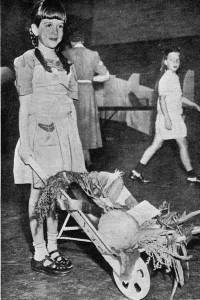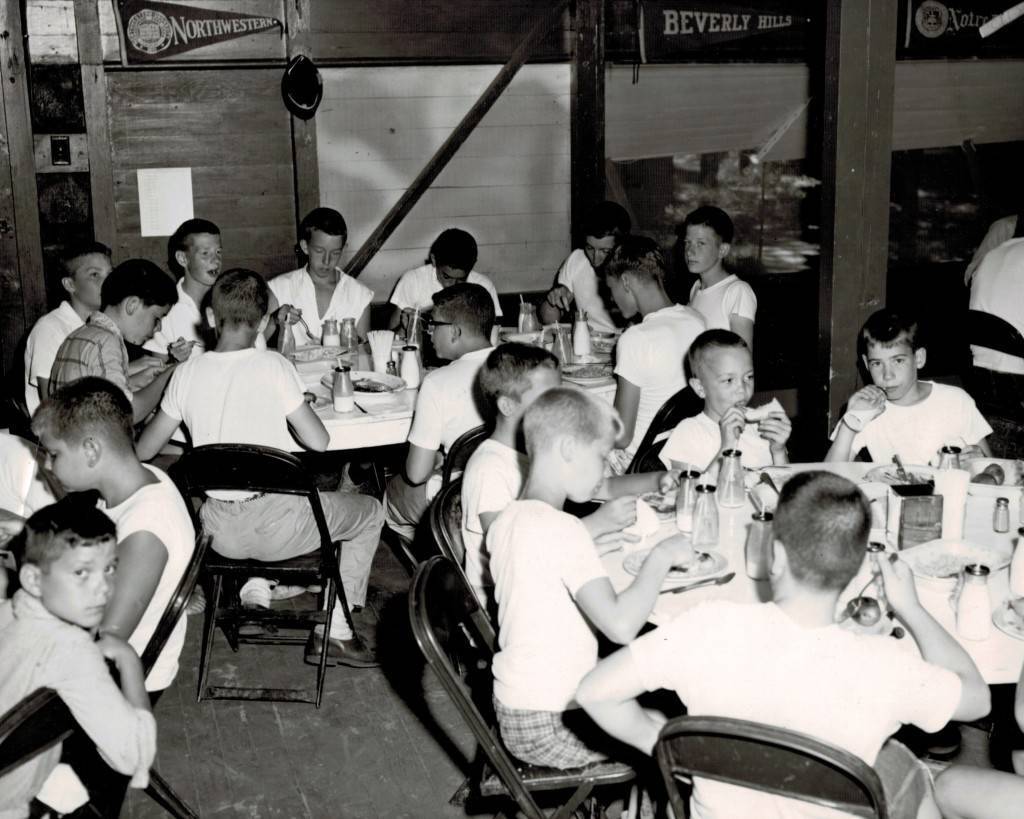
Summer of ’44: A Local Story
Categories: Gazette
Gazette Article by Nan Greenough
Appeared in the Gazette: Fall 2011
Dramatic World War II stories from the battlefront understandably obscure the quieter tales on the home front. Yet nearly everyone within our country’s borders experienced the war effort though ration cards, recycling requirements, and product scarcity. Labor shortages in manufacturing made jobs outside the home available to women. Windows were blacked out as a precaution against air raids. Civilian volunteers were trained to assist neighbors in the event of an enemy attack. Families had to “do more with less.”
During the war, the Winnetka Community House (WCH) served as a center for an enormous variety of war-related efforts. It housed the Winnetka Civilian Defense Council’s Community Service Corps, which included block-by-block organization of the Village for information and emergency purposes, and over 30 committees, many of them formed to assist servicemen and their families at nearby military bases during the war and convalescing veterans after the war. The bowling alley and gym were opened to servicemen. With Community House direction, children collected recyclable metals in their wagons and helped tend Victory Gardens at home. Citizens held dinners to raise money for refugees in faraway places. Bond rallies attracted civilian investment in the war effort.

Featured in the August 19, 1943 Winnetka Talk is Joan Lois Davis at the WCH-sponsored Victory Garden Show with the prize-winning wheelbarrow of vegetables.
WCH files cover not only these widespread efforts, but the local challenges of running activities in a normal way during an era of scarcity. One program required special creativity on the part of WCH Board Members. Camp Douglas Smith, a summer camp near Ludington, Michigan, was started in 1936 by Kenneth G. Smith and Community House director Dr. J.W.F. “Chief” Davies. Its purpose was “to provide at the lowest possible cost, an adventurous, educational and healthful experience in group living.” Each summer, two camp sessions offered Winnetka youth the widest variety of outdoor activities.
In 1942, just six years into the program, there was a question as to whether the camp could continue during the following summer, due to the imminent introduction of rationing. The Community House responded with long-range planning to assure a camp food supply. “Staples were purchased early and stored in the basement of the Community House.” A primary goal was to offer a balanced diet to campers. Camp Committee Chairman V.J. Killian wrote, “Knowing that there would be a shortage of meats, we made an early contract with one of the camp neighbors…to furnish chickens for the camping seasons… We still have some (ration) points left that may be used for the purchase of foods for the 1944 season.” He continues, “We know now that if rationing is still in control next season (1944), we will have to get foods by doing our own canning.”
The Community House’s efforts to obtain pressure cookers for canning provides a snapshot of wartime bureaucracy. Starting in early 1943, a series of letters sought to acquire pressure cookers for canning some of the excess harvest from Winnetka’s more than 900 Victory Gardens.
Stop to consider the effort this one item encompassed, multiply it by the many thousands of items that were limited in supply due to the war effort, and you begin to see how the war affected every facet of life on the home front.
An April 1943 U.S Department of Agriculture (DOA) War Board Memorandum explains that it had acquired allocation of material to produce 150,000 pressure cookers for the entire country (versus an estimated need for 500,000). The DOA suggested that each state’s War Board establish an “advisory committee” to assist in a pressure cooking rationing program. The memo continues with a 21/2 page single-spaced advisory as to the committee’s membership and its criteria for distribution of pressure cookers.
WCH Board Member Walter F. Straub sent a plaintive letter to his friend Bill Dunn at the “Processed Food Rationing Division” of the Office of Price Administration (OPA), “I told my Associates on the Board that the Processed Foods Rationing Division was one part of the OPA that had some real live wires in it and as a Community Center, we could count on your Division for help in this matter.”
Mr. Dunn sent Mr. Straub to the DOA, but finished his letter enigmatically, referring to prior correspondence, “You may be certain that prune juice is coming in for its share of discussion.” R.J. Aherne from the DOA’s Food Distribution Administration sent the War Board Memorandum and presumably the Community House engaged with the Illinois “advisory committee of pressure cooking rationing.”
Only four months later, canning at the Community House was in full swing: in just one day, 138 cans of beans, carrots, tomatoes, beets or corn, donated by eight Victory Gardeners, were “put up” by 14 volunteers. Thirty-eight five-hour canning sessions preserved the summer’s surplus. The 1944 camp year was saved!

Boys in the dining hall, August 4, 1961
The award-winning Winnetka Historical Society exhibit on World War II examined Winnetka’s “home front” along with Winnetkans’ stories from the battle front. See the online version of this exhibit here: http://localheroes.omeka.net/

No comments yet.